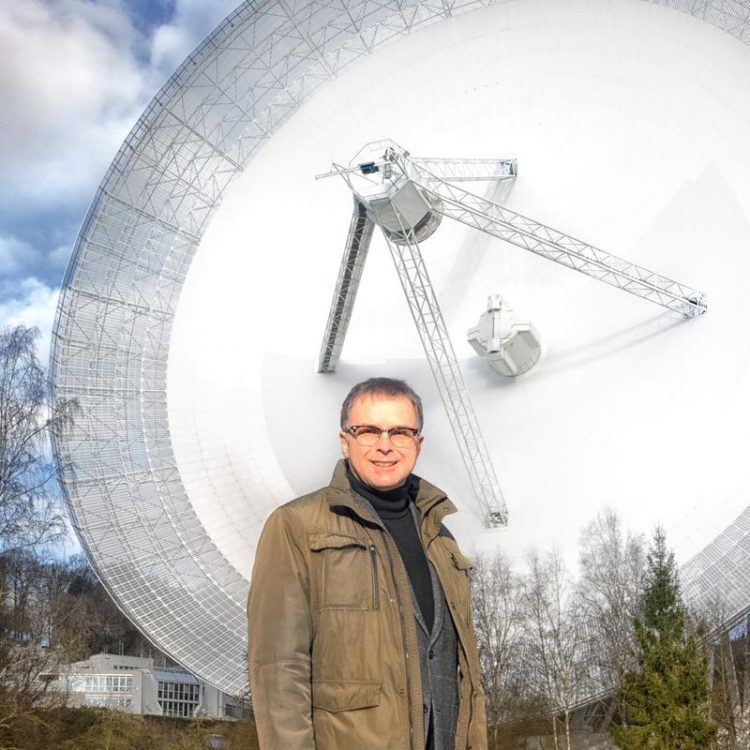Radio astronomers score high marks in the competition for EU funding

Prof. Anton Zensus from the MPI for Radio Astronomy is proud that the coordination team of RadioNet is hosted in Bonn. Norbert Tacken/MPIfR
RadioNet will provide support for various aspects of radio astronomical research in Europe; it will enable scientists from all over the world to use the radio telescopes and data archives of the consortium members for their research free of charge.
The members will join forces to develop new radio receivers that can be used at many European radio observatories. RadioNet will foster the creation of new software necessary to process the enormous data flow expected from these new receivers and to ensure that they are of high quality and free from interferences.
“RadioNet allows us not only to make more efficient use of the members’ radio telescopes; by combining the data from radio observatories all over Europe and world wide, we can achieve images with a resolving power that would normally require a telescope with a diameter of thousands of kilometres”, explains Prof. J. Anton Zensus, Director at the Max Planck Institute for Radio Astronomy (MPIfR) and speaker of the RadioNet consortium.
He leads the research department for Radio Astronomy and Very Long Baseline Interferometry (VLBI) at the MPIfR, one of the key centres of expertise for VLBI in Europe. Amongst other things, VLBI allows astronomers to study the events in the immediate vicinity of the cores of active radio galaxies.
One activity of RadioNet will be the joint development by several of the RadioNet partners of a new receiver system named BRAND (BRoad bAND), which completely covers the wide frequency range from 1.5 to 15 gigahertz.
“For astronomers and observatories, using the new BRAND receiver will have several advantages: there will be less maintenance necessary and more available time for astronomical observations since all frequency bands between 1.5 and 15 Giga Hertz can be used simultaneously”, explains Walter Alef, who leads the BRAND project at the MPIfR. “By using BRAND the European telescope network will assume a worldwide leading role in VLBI observations.”
One declared goal of the Bonn astronomers is to study the details of the central regions of our Milky Way and other galaxies. The underlying assumption is that supermassive black holes provide the central energy sources of such galaxies. In the context of the Event Horizon Telescope, the scientists even hope to image the immediate vicinity of the black hole in the centre of our Galaxy at short wavelengths.
“Each of the partners of our consortium possesses world class technology and expertise. We want to focus all these resources and thus expand European leadership in the area of radio astronomy”, says Anton Zensus, “We regard it as an acknowledgement of our work and our expertise that we are entrusted with coordinating this important project.”
Training and knowledge transfer of researchers and engineers, as well as the common use of resources, are important aspects of the RadioNet project in order to ensure the leading role of European research institutions in global observatories such as the “Atacama Large Millimeter/submillimeter Array” (ALMA) or the Square Kilometre Array (SKA). Prof. Zensus is confident that the success of the RadioNet cooperation will eventually make it self-sustainable.
The official start of RadioNet activities for the next four years is celebrated today. January 12th, 2017, in a kick off meeting at the Harnack House of the Max Planck Society in Berlin.
RadioNet is a consortium of 28 partner institutions from the following 13 countries: Finland, France, Germany, Ireland, Italy, Latvia, the Netherlands, Poland, Spain, Sweden, the UK, and South Africa and South Korea.
Contact:
Prof. Dr. J. Anton Zensus
Director and Head of Research Department „Radio Astronomy / VLBI“
RadioNet Coordinator
Max-Planck-Institut für Radioastronomie, Bonn.
Fon: +49 228 525 378
E-mail: azensus@mpifr-bonn.mpg.de
Dr. Izabela Rottmann,
RadioNet Project Manager
Max-Planck-Institut für Radioastronomie, Bonn.
Fon: +49 228 525-281
E-mail: irottmann@mpifr-bonn.mpg.de
Dr. Norbert Junkes,
Press and Public Outreach
Max-Planck-Institut für Radioastronomie, Bonn.
Fon: +49 228 525-399
E-mail: njunkes@mpifr-bonn.mpg.de
Media Contact
All latest news from the category: Awards Funding
Newest articles

Silicon Carbide Innovation Alliance to drive industrial-scale semiconductor work
Known for its ability to withstand extreme environments and high voltages, silicon carbide (SiC) is a semiconducting material made up of silicon and carbon atoms arranged into crystals that is…

New SPECT/CT technique shows impressive biomarker identification
…offers increased access for prostate cancer patients. A novel SPECT/CT acquisition method can accurately detect radiopharmaceutical biodistribution in a convenient manner for prostate cancer patients, opening the door for more…

How 3D printers can give robots a soft touch
Soft skin coverings and touch sensors have emerged as a promising feature for robots that are both safer and more intuitive for human interaction, but they are expensive and difficult…





















